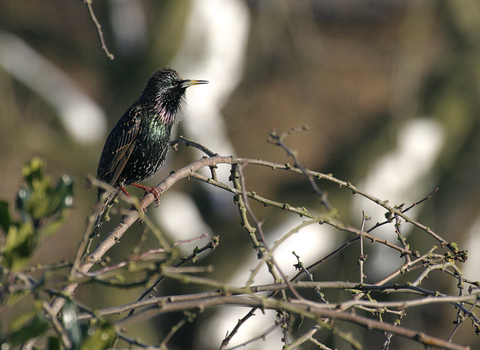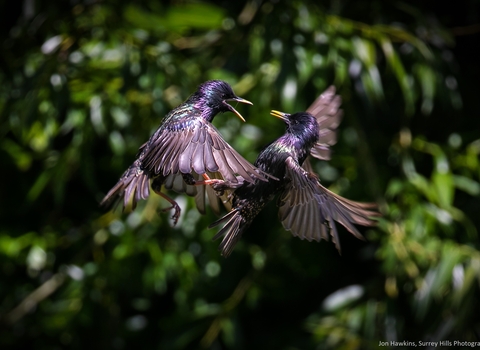
©Wildstock

Jon Hawkins, Surrey Hills Photography

A murmuration of starlings - Guy Edwardes/2020VISION
Starling
The starling is a familiar garden visitor that has a beautiful purple-and-green sheen to its black feathers. It is famous for its wintry aerial displays - massive flocks can be seen wheeling over our towns and farmland.
Scientific name
Sturnus vulgarisWhen to see
January to DecemberSpecies information
Statistics
Length: 22cmWingspan: 40cm
Weight: 78g
Average lifespan: 5 years
Classified in the UK as Red under the Birds of Conservation Concern 5: the Red List for Birds (2021). Protected in the UK under the Wildlife and Countryside Act, 1981. Priority Species under the UK Post-2010 Biodiversity Framework.
About
The starling is a familiar bird of farmland, parkland, gardens and towns. Sociable birds, starlings spend a lot of their time in large flocks, roosting and performing sweeping, aerial displays - they can often be seen moving fluidly through a wintry sky. starlings eat insects and fruit, and will visit birdtables and feeders. They make untidy nests in holes in trees or in buildings, in which the female lays five to seven eggs. Both parents raise the chicks.How to identify
Adult starlings are a beautiful, oily black colour, with a purple and green sheen. In the winter, they are covered in tiny beige spots. Young starlings are dark grey-brown.Distribution
Widespread.Did you know?
Enormous winter flocks of starlings can number more than a million birds! These flocks are predated upon by peregrine falcons, but the flock can be seen wheeling and diving as one great pattern as individuals try to avoid being caught.Watch
Starlings (https://vimeo.com/453715689)
Starlings by Russell Savory
